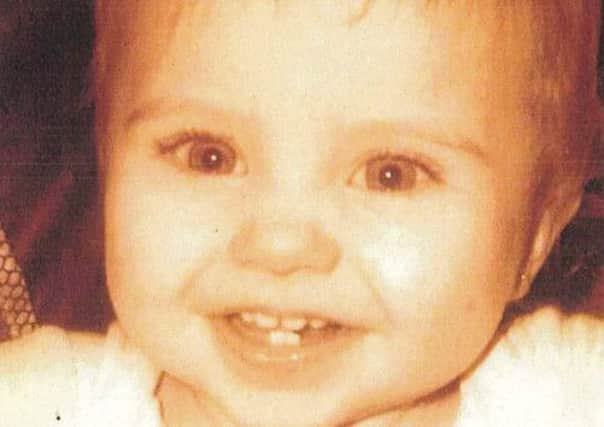Declan Hainey death: Mother to be freed from jail


• Kimberley Hainey, the mother convicted of killing her son, has won an appeal to overturn convictions of murder and attempting to defeat ends of justice and will be freed from prison
• Court criticises original trial judge for inadequate direction to jury on complex medical issues
Advertisement
Hide AdAdvertisement
Hide Ad• Evidence submitted by ‘expert’ witnesses citing malnutrition as contributing of death ruled as inconclusive, leading to miscarriage of justice
• Declan Hainey, who was nearly two-years-old, was found mummified in his cot eight months after he was last seen alive
Kimberley Hainey, 38, was freed yesterday after the Court of Criminal Appeal in Edinburgh strongly criticised the judge at her trial for giving inadequate directions to the jury on complex medical issues.
The court also questioned the choice of “expert” witnesses by the Crown, and the evidence they had given, which was crucial to a jury deciding Hainey had murdered the boy, Declan, at their home in Paisley, Renfrewshire.
The judges suggested a change in procedure, allowing pre-trial examination of medical evidence, to avoid similar problems in other “anxious and troubling” cases.
Hainey had been told on Wednesday at the court that her conviction for murdering Declan was to be overturned. She had received a life sentence, with a minimum of 15 years.
The case was continued overnight for consideration of a second charge, of attempting to defeat the ends of justice, for which Hainey had received a seven-year term.
The Crown announced it was not seeking a retrial of Hainey on the murder charge, and that it would not oppose any belated appeal by her on the other charge.
Advertisement
Hide AdAdvertisement
Hide AdThe judges said they regarded the Crown’s position as the “proper exercise of discretion” and, in the circumstances, the convictions for both offences would be quashed.
Hainey wept as she was led downstairs to the cells from where she was returned to prison to be freed.
Declan’s mummified body was found in his cot in March 2010, eight months after he was last seen alive and just short of his second birthday. Pathologists were unable to give a cause of death.
Hainey, who had a history of drug abuse, was accused of abandoning Declan for long periods without food or drink, and she was found guilty of the murder charge by a majority verdict.
The trial heard she initially had come across as a devoted, attentive and competent mother, but began to leave the boy alone, and kept family and social services at arm’s length.
She said she had found Declan dead in his cot one morning in the summer of 2009, and she had gone into denial. It was then, she stated, that she had allowed the flat to become squalid.
“It was never like that when Declan was alive – we were both spotless,” she said.
Professor Sue Black and Dr Craig Cunningham, forensic anthropologists based at Dundee University, gave evidence about “Harris lines”, marks on Declan’s bones, which they contended were indicative of neglect and malnutrition. Other experts cast serious doubt on the suggestion, but Hainey was convicted.
Advertisement
Hide AdAdvertisement
Hide AdLord Clarke, who heard the appeal with Lords Mackay and Drummond Young, said the trial judge, Lord Woolman, had failed to give the directions required in such a case. He said it was of the utmost importance that experts chosen by the prosecution should have the relevant qualifications, competence, expertise and experience to speak to the matters about which they were invited to give evidence.
The judges noted that, in England, medical evidence was considered at a pre-trial hearing. “It may be that the time has come for some thought to be given to providing for such an approach in Scotland in such cases,” Lord Clarke said.
A Dundee University spokesman said: “Both Professor Black and Dr Cunningham are qualified forensic anthropologists and gave evidence on that basis.”